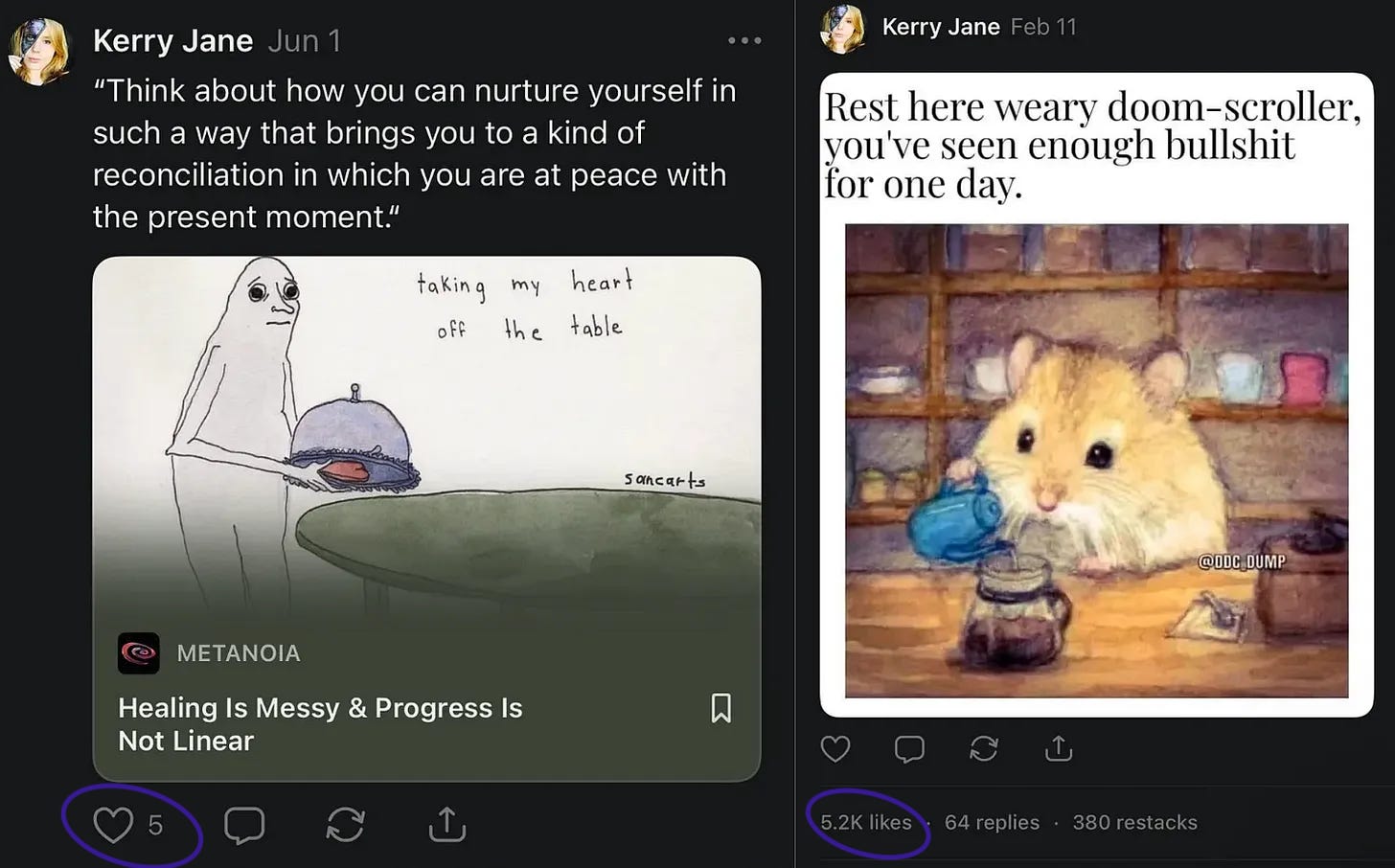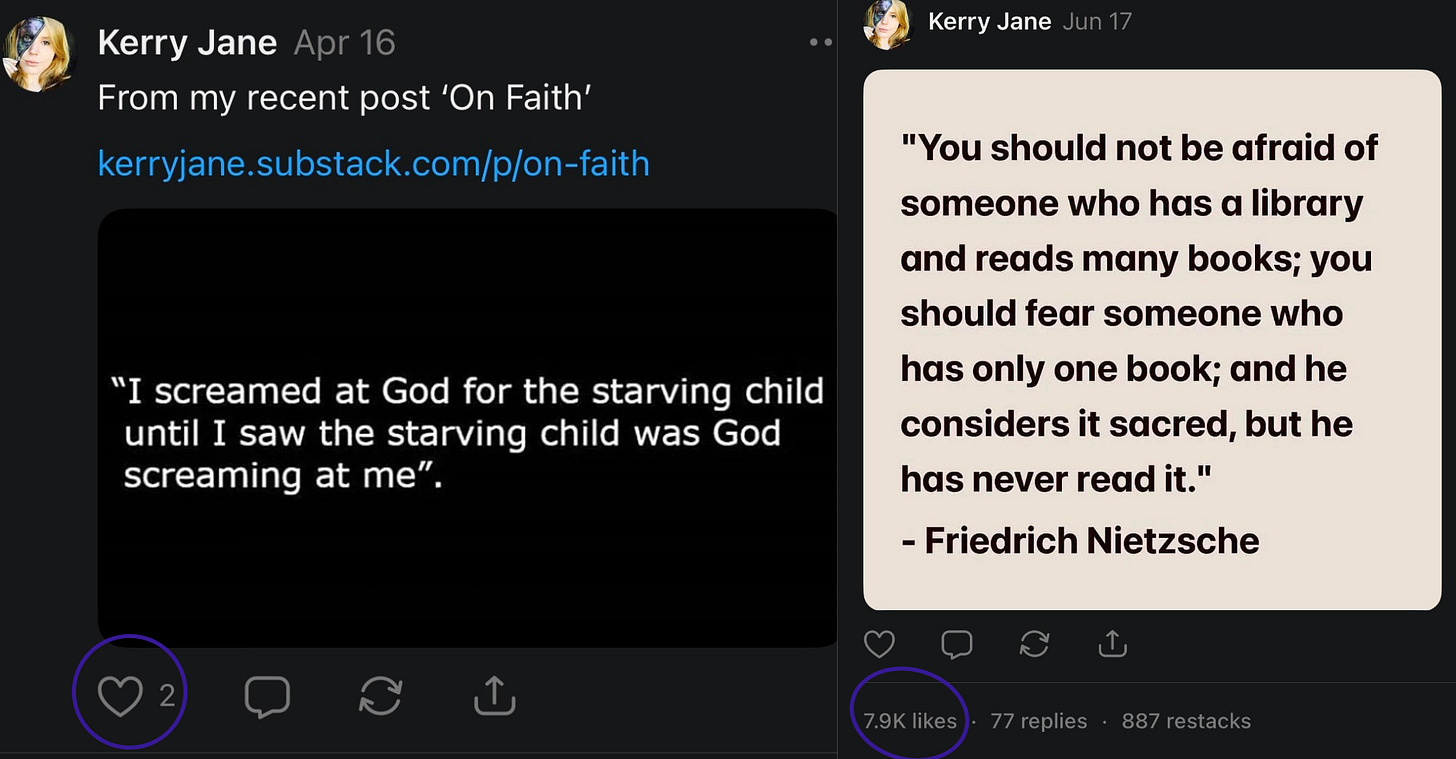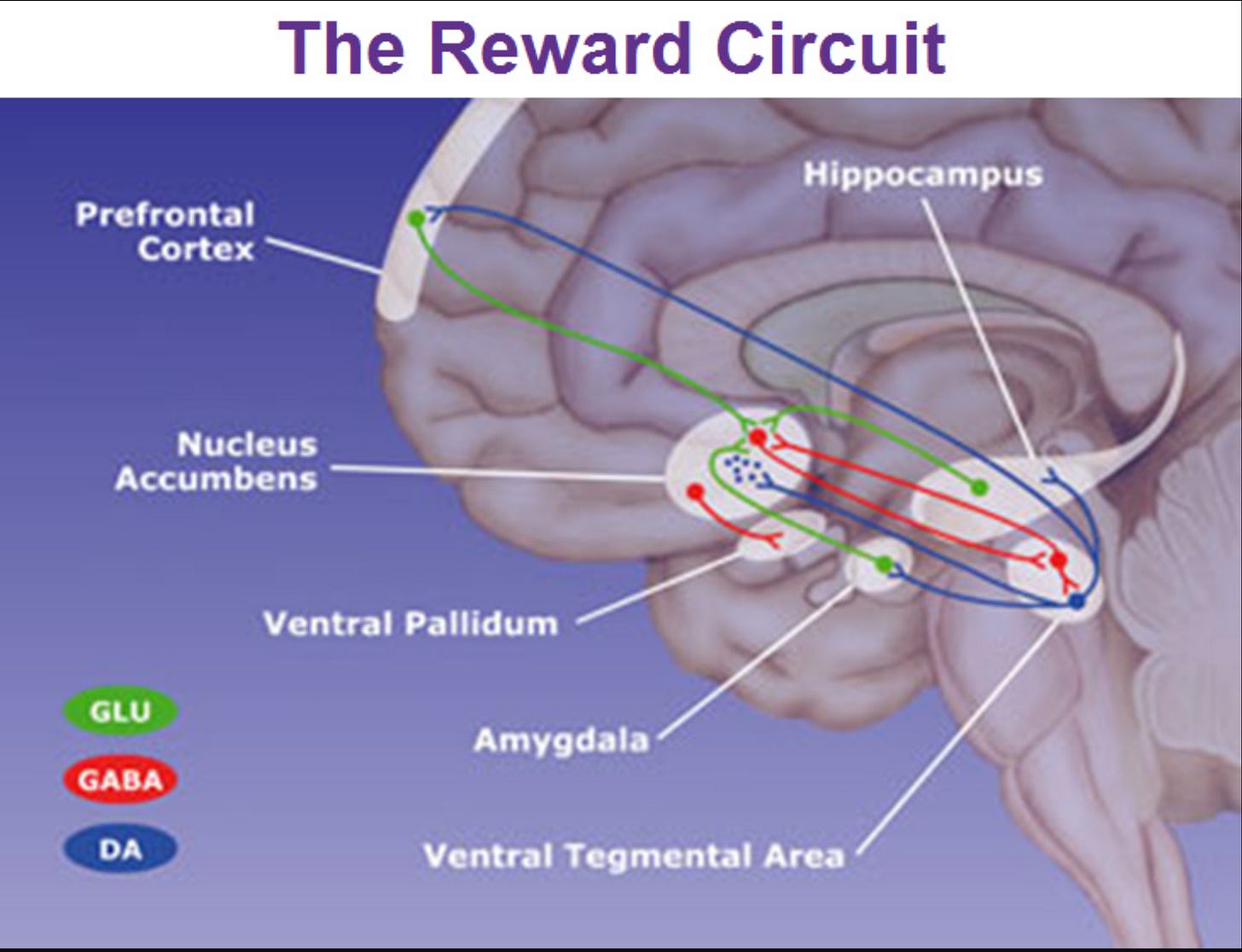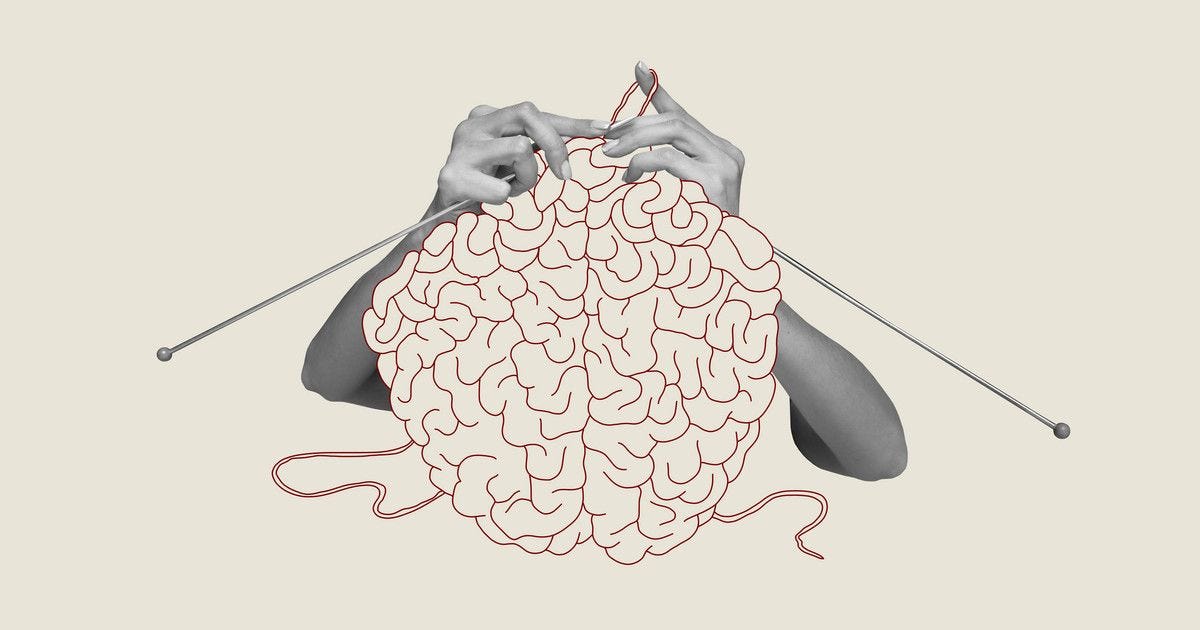Figure 1. Notes that can be categorized under the topic of self-care, one showcasing my writing (left) and one showcasing a meme (right)
Figure 2. Notes that can be categorized under the topic of religion, one showcasing my writing (left) and one showcasing a meme (right)
I’ve seen many people on Substack express justified concerns about the lack of engagement of their publication compared to the attention received on notes, particularly for notes regarding politics, religion, humor, etc. (the brain candy as it were).
I’ve also seen a lot of complaints from people expressing that they don’t like what their feed has turned into.
Writers wonder if within a few years, anybody will care about writing in this space, or if Substack will just become another influencer machine. It goes without saying that this would be devastating for all of us who sought refuge here as we fled from Twitter, Instagram, Facebook and Youtube.
I think we have blamed a lot of the moral decay and lack of substance on other social media platforms solely on the algorithm. First and foremost, social media algorithms have, without a doubt, left a significant negative impact on our mental health, and our society at large with its power to influence elections, drive consumer culture, and to amplify the worst in people.
However, algorithms are partly made to respond to our behavior. Consequently, we are responsible for telling it what to do. What we’ve been telling it to do is to feed the base desires of the amygdala, and I think it’s time we took a look at that.
We are programmable.
Our lack of awareness of this has put us in danger. Nefarious interests are aware of your vulnerabilities and use it to their advantage. Take the entire advertisement industry, for example. There’s a whole production well aware of human psychology and how to trick you into behaving the way they want—and it’s not just them, but that’s a topic for another day.
We are unconscious to the extent to which we are programmable and sometimes I think we inflate algorithms as the sole reason for the lack of engagement on our work. There are so many aspects to human psychology that influence what we pay attention to and what we engage with. We have the power to be aware of this and adjust our behaviors accordingly, whether we’re willing to admit it or not. Some of these psychological characteristics include:
The human need to be told what’s good (a form of seeking validation)
The human need to be told what to want (the social need for conformity)
The human need to be told you’re right and everyone else is wrong (confirmation bias)
Our preference for an easy experience rather than a proactive, mindful one that demands our direct attention and participation in the process of consuming media (Laziness. Humans are lazy).
Humans will always choose the fast food burger and Coca-Cola that sends them into heart failure over the roasted chicken and vegetables that gives their body what it needs to function properly.
We’re only talking about social media today, but all these points also explain how your loving uncle became a racist curmudgeon at the mercy of Fox News.
Many of us no longer watch television, or even mainstream news, but this doesn’t mean we’re safe from the other systems like the one you’re interacting with right now.
It doesn’t take a lot to see we are committed to being unconscious consumers, allowing external influences to determine what’s worth our time.
I agree, it’s frustrating having to spend so much energy cutting through the noise to get to the kind of experience you want and need. Consciously shaping your day-to-day experience is plain hard work, but the alternative is giving up your agency to become a product of an algorithm, of someone else’s interest. If that doesn’t sound scary to you, something’s wrong.
I am guilty of everything that I’ve outlined here so far, but there are some habits I’ve fostered throughout the years that allow me to continue using social media and other online resources in a way that keeps me in a state of inspiration and growth.
Below is a list of how I practice being a conscious consumer online. Feel free to steal any of these:
I manually tell my feed what I want. Constantly. On Substack, this looks like tapping the three dots on the top right of a note, selecting “Hide Note”, and then selecting “Show fewer notes like this.”
I actively search for what I want to read. When I find a silly meme that strikes a chord, I investigate further. I look at what that person has written on their publication and read what they’ve written. I make an effort to engage with it if there’s something I genuinely like. I make sure that I spend equal amounts of time engaging in meaningful ways as I do scrolling. I look at the comments, and do the same. I look at the people who also liked the media. It could be a pretty photo, an insight, or a meme, it doesn’t matter. I’ve decided exactly the kind of experience I want and need online, and like a surgeon have cut out what isn’t helping me as a writer, or as a person. I’ve gone out of my way to engage with what feeds my soul. Which brings me to the next point…
I value substance over anything else. For me that means something that made me laugh, something that holds an uncomfortable mirror up to society, or something that brought me to a place that I couldn’t get to on my own. I can’t say what this means for you, but if you don’t decide, the algorithm (aka corporate interests and the hysteria of the masses) will make that decision for you. Consider the online forum a buffet. I highly encourage you to fill your plate with just as much fruit, vegetables and meat as you do cookies, candy and junk food. If not, you will find yourself sick, empty, and wondering why.
I’ve become aware of how most people online are projecting their own inner turmoil onto others. I learned this a long time ago when I first started writing on Wordpress. Many people are just looking for a place to dump their overwhelming thoughts, opinions, and trauma. In my case specifically, many people are triggered by the truth of what I say here. It takes a long time to determine what’s worth your time and what isn’t- in fact I think learning this never stops because knowing when to respond and when not to involves a lot of nuance that can’t be generalized. The best thing I think we can do (as writers) is simply find a way to write about it. We are so lucky that we have this outlet. I know so many people who suppress their contention until it festers and develops into a kind of psychosis that is unleashed on family and friends. Here, we have this unique opportunity to identify the root of a problem, pick it apart, process it, and present it to our peers. Both the reader and the writer benefit from this process, but only if we make the conscious decision to engage in this way, rather than mindlessly scrolling and letting it all consume us. If we’re not careful, what we consume will consume us.
When I don’t have the time for all of this, I’m at least aware of it. I’ve become disciplined enough to enjoy the easy junk food media while knowing it’s not really doing anything for me. I’m left hungry, and it’s not long before I find myself back in a groove of enjoying the work of all the writers in this community and beyond.
I’ve been working pretty hard at all these things, and I’ve come to love the online space I’ve made for myself.
It’s kind of like flossing your teeth. You hate doing it, you hate remembering that you need to do it, and it feels weird. But ultimately it saves you a lot of grief in the dentist chair, and you get to keep having teeth 👍.
If Substack users were conscious consumers, they would have liked the post on self-care or religion that I shared at the beginning of this piece, navigated to my publication, and explored what interested them. They would have engaged with it if it resonated—or simply shown up and left. The stats don’t lie: that’s not what happened, and it’s not what’s happening for everyone here.
The Conclusion:
What’s wrong with Substack is that it consists entirely of imperfect humans that may or may not take an active role in establishing healthy online habits, content curation, and generally everything it takes to be a conscious consumer in today’s world, which is like a full-time job.
The uncomfortable truth is that this space is what we make of it.
We can only blame algorithms and the pitfalls of technology for so long until we look in the mirror and take responsibility for our role and acknowledge that we are the ones guiding the set of instructions to begin with. Substack, along with any social media platform or technology, can only be as good as how the collective decides to use it. What we decide is worth our time, energy and attention will be amplified and sent back to us. The real question is not how technology and social media will benefit/hurt us. The question is— will humans be able to be disciplined enough to use the tools at hand properly.
Everything is just that, a tool. You wouldn’t blame a screwdriver for drilling a nail into a foot, you’d accuse the person wielding it. If what we value is reading, quality writing, inspiration, growth, perspective, wonder, creativity, critical thinking, depth, and learning, then we need to act like it. If we value writers, then we need to act like it. Or maybe that isn’t what we value, and that is what needs to be addressed.
Stop giving all your power away to the instruments at your disposal, and start taking responsibility for how you wield it, otherwise all our innovations will only ever be used for war, deception, and consumerism rather than peace, integrity and liberation.









That’s exactly how I feel about Substack, and about any tool we use online. It’s not the platform, it’s how we engage with it. I’m glad to see others voicing what I’ve been quietly thinking for a while. This post didn’t tell me something new, but it did put words to the concerns I already have. Thank you for articulating it so clearly.
This was beautifully written. The funny thing is, I was just thinking about algorithms when I got the notification for this.